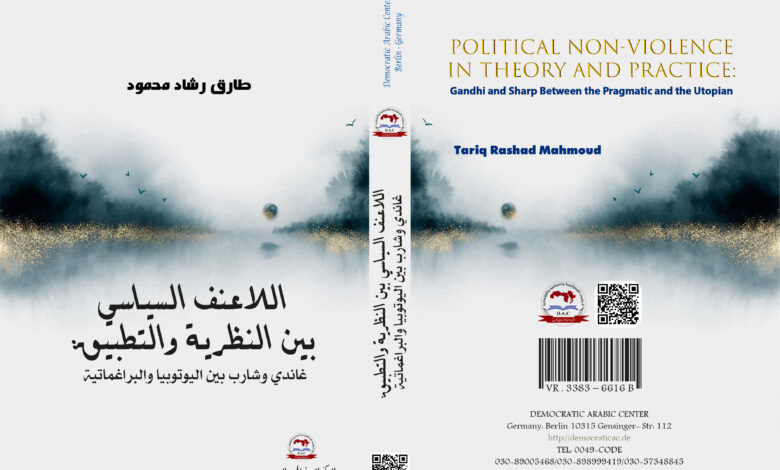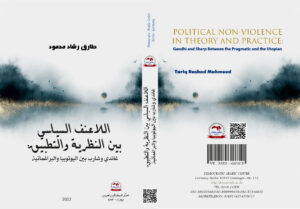اللاعنف السياسي بين النظرية والتطبيق : غاندي وشارب بين اليوتوبيا والبراغماتية
Political Non-violence in Theory and Practice: Gandhi and Sharp Between the Pragmatic and the Utopian

تأليف : طارق رشاد محمود
نسخة “pdf”-
اللاعنف السياسي بين النظرية والتطبيق غاندي وشارب بين اليوتوبيا والبراغماتية
الطبعة الأولى “2022″ –من كتاب: –
اللاعنف السياسي بين النظرية والتطبيق غاندي وشارب بين اليوتوبيا والبراغماتية
جميع حقوق الطبع محفوظة #المركز_الديمقراطي_العربي ولا يسمح بإعادة إصدار هذا الكتاب أو اي جزء منه أو تخزينه في نطاق إستعادة المعلومات أو نقله بأي شكل من الأشكال، دون إذن مسبق خطي من الناشر .
تقديم :
عالجت الدراسة كيفية عمل اللاعنف ومدى فعاليته في الشؤون السياسية على المستويين النظري والتطبيقي، فعالجت على المستوى الفكري فلسفة كل من موهانداس كرمشاند غاندي (1869-1948) وجين شارب Gene Sharp (1928-2018)، الأول من الهند وينتمي للفلسفة الشرقية والثاني أمريكي وينتمي للفلسفة الغربية، وعلى المستوى التطبيقي رصدت الدراسة حركة استقلال الهند عن الكولونية البريطانية في الفترة 1857-1948، وحركة المقاومة في جنوب أفريقيا ضد نظام الأبارتايد في الفترة 1948-1991.
انطلقت الدراسة من الفكرة الأساسية التي يؤكد عليها دعاة اللاعنف القائلة بأن اللاعنف لا يعني عدم استخدام العنف فحسب، وهو لا يعني الاستسلام في مواجهة الاستبداد وإنما هو تمرد يتميز بالمبادرة ونبذ الخوف مع التأكيد في الوقت ذاته على نبذ العنف، وهو بذلك يقع بين الإذعان والخضوع من جهة وبين الكفاح المسلح من جهة أخرى، ويركز في أساليبه على العمل الجماهيري من خلال سحب شرعية السلطة الحاكمة واللاتعاون والعصيان المدني بهدف شل عمل الحكومة ودفعها إلى المفاوضات وتقديم تنازلات أو إسقاطها كلياً.
تعدُّ فلسفة غاندي بمثابة امتداد للفلسفة الدينية الأخلاقية التي شغلت حياة الهند منذ فجر التاريخ، فعلى الصعيد النظري دعا غاندي إلى ثورة أخلاقية تتناغم مع اللاعنف المبدئي الذي عدَّه بمثابة أسلوب حياة وليس وسيلة عابرة، فهو وسيلة وغاية في الوقت ذاته، وكان لديه الجرأة أن دعا إلى إخضاع الشؤون السياسية والاقتصادية والاجتماعية للأخلاق والضمير الفردي بعيداً عن تدخل الدولة وجبروتها، فكان الرجل أنيركي يوتيوبي الدعوة، ولكنه على أرض الواقع اتسم بالبراغماتية إلى حد كبير واشترك أو أيد العديد من المواقف التي اتسمت بالعنف مسوغاً ذلك العنف باسم اللاعنف. ربما كان غاندي براغماتياً في كثير من مواقفه السياسية، ولكنه بقي مثالياً في تفكيره النظري.
تعدُّ فلسفة شارب بمثابة امتداد للمدرسة البراغماتية الأمريكية المنشأ والتطبيق، ولذلك تبنى اللاعنف ليس لأسباب أخلاقية كما هو الحال مع غاندي وإنما لأنه أسلوب فعال في إسقاط الحكومات الاستبدادية، ولم يعر شارب أي اهتمام لتفسير آلية الأحداث، فقد ركز على الإجابة عن “كيف” يعمل اللاعنف، وليس “لماذا” يعمل هكذا، أي أنه قدم وصفاً لآلية الحدث وليس تعليلاً له، ولذلك نجد أن شارب تناول باستفاضة تقنيات العمل اللاعنفي، ولم يتناول- مع أنه أشار إلى أهميتها- العوامل الاجتماعية والاقتصادية والثقافية والدولية وغيرها من العوامل الأخرى وكيفية تفاعلها وتأثيرها على مجرى الصراع، وإذا كان غاندي قد دعا إلى ثورة في القيم والأخلاق فإن شارب دعا إلى ثورة مؤسسات تتناغم مع اللاعنف البراغماتي، حيث دعا إلى إقامة مؤسسات ديموقراطية وإقصاء الجيش عن السياسة ووضع دستور بشكل عاجل بصرف النظر عن الهيكل الاجتماعي والاقتصادي والثقافي للدول.
لعب اللاعنف دوراً في كل من استقلال الهند عن الإمبراطورية البريطانية وتصفية نظام الأبارتايد في جنوب أفريقيا، ولكنه لم يكن العامل الوحيد، ولم يكن العامل الحاسم، فالصراعات السياسية والاجتماعية تتميز بالتعقيد بفعل تعدد العوامل وتفاعلها، فإلى جانب اللاعنف كان هناك العنف الداخلي والعوامل الدولية، فكان لسقوط النظام الاستعماري المباشر برمته وسقوط الإمبراطورية البريطانية دور حاسم في استقلال الهند والعديد من الدول الأخرى وذلك على أثر حربين عالميتين في غضون ثلاثة عقود تخللهما الكساد العظيم الذي عصف بالاقتصاد العالمي، وفي جنوب أفريقيا شكل انهيار الإمبراطورية السوفياتية وإعادة تشكيل النظام الدولي الجديد دوراً حاسماً في القضاء على نظام الأبارتايد واستقلال العديد من الدول الأخرى. ويبدو أن الهيكل الدولي والجيوش، وليس ثورات الشعوب، سواء أكانت عنفية أم لاعنفية، لها الوزن الأكبر في تحديد اتجاه محصلة القوى.
Tariq Rashad Mahmoud
Abstract
This study examines the way non-violence works and how effective it is in political contexts, both theoretically and practically. On the intellectual level, it examines the philosophy of Mohandas Karamchand Gandhi (1869- 1948) and Gene Sharp (1928 – 2018). The former is Indian and belongs to Eastern philosophy and the latter is American and belongs to Western philosophy. On the practical level, on the other hand, the study examines the Indian independence movement that fought against British colonialism from 1857 to 1948 and the anti-apartheid movement in South Africa between 1948 and 1991.
The study focuses on the claim that non-violence is not limited to refraining from utilizing violence and does not refer to yielding in the face of oppression, but it is a form of rebellion that is distinguished by initiation, renouncing fear, and rejecting all forms of violence. Hence, it falls in a spectrum between submission and armed struggle. It also depends on the work of the masses to delegitimize the governing authority through non-cooperation and civil disobedience in order to paralyze government functions and cornering the government into negotiating, compromising, or overthrowing it completely.
Gandhi’s philosophy is considered an extension of the ancient Indian religious-moral-philosophy. Theoretically, he has called for a moral revolution that fits with principled non-violence, which he considered a way of living rather than a tool and both a mean and a purpose. Further, he called for moralizing political, economic, and social issues and separating them from the government’s intervention. Gandhi’s teachings are anarchist and utopian. However, his reality is pragmatic to a great extent as he engaged and supported several ‘violent’ events while justifying that with the means of non-violence. Gandhi might have had many pragmatic decisions, but his theoretical teachings remain idealist.
Sharp’s philosophy, on the other hand, is an extension of American pragmatism in theory and in application. He adopted nonviolence, not for ethical reasons, but because it is an effective method to overthrow totalitarian governments. He focuses on understanding ‘how’ non-violence works without trying to understand ‘why’ it does. He presents a description of the process rather than the reasons behind it. Hence, Sharp extensively discusses the mechanism of non-violence and overlooks the interplay and effects of social, economic, cultural, international, and other factors on the course of conflict. As Gandhi calls for a moral revolution, Sharp calls for an institutional revolution that fits with pragmatic non-violence. He calls for establishing democratic institutions, excluding the military from politics, and urgently drafting a constitution regardless of the social, economic, and cultural structure of different nations.
Non-violence has played a major role in the independence of India and ending the apartheid system in South Africa, but it was neither the only nor the determining factor. Political and social conflicts are characterized by complexity due to the multiplicity and interaction of factors. In addition to non-violence, internal violence and international factors played a determining role. The fall of colonial rule and the fall of the British Empire has played a major role in the independence of India and several other countries, which followed two world wars that continued over the course of three decades and a devastating international economic crisis known as the Great Depression. The fall of the Soviet Empire has reshaped the international structure and has played a vital role in ending the apartheid system in South Africa and the independence of many other countries. Seemingly, rather than the uprising of the people, be it violent or not, international structure and the military has the upper hand in respect of directing power.
- الناشر: المركز الديمقراطي العربي للدراسات الإستراتيجية والسياسية والاقتصادية





